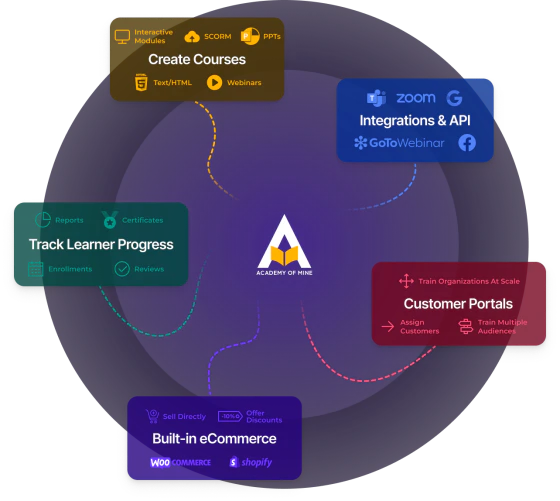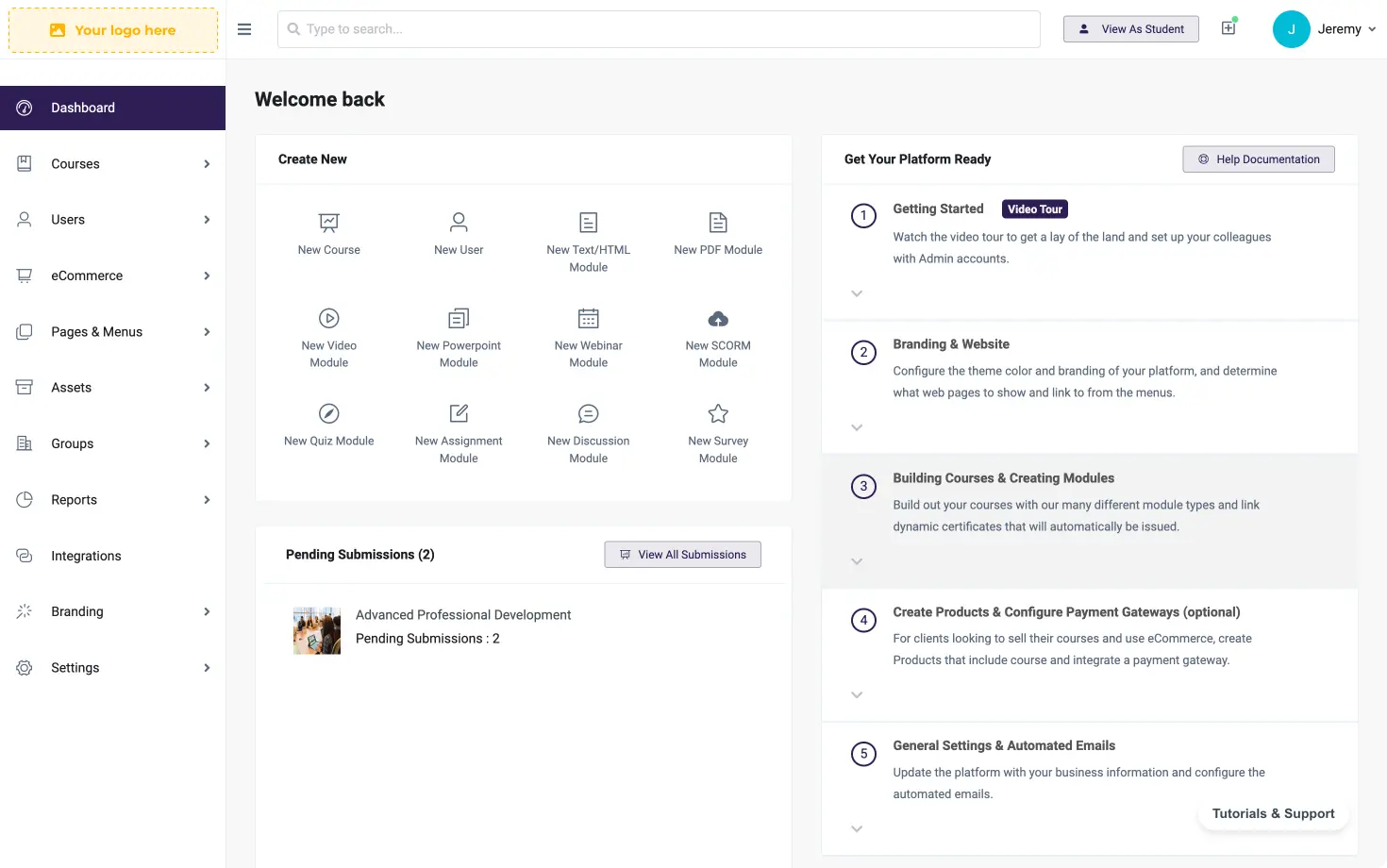Learning Management-System, Self Paced Learning
The Best SaaS Learning Management Systems
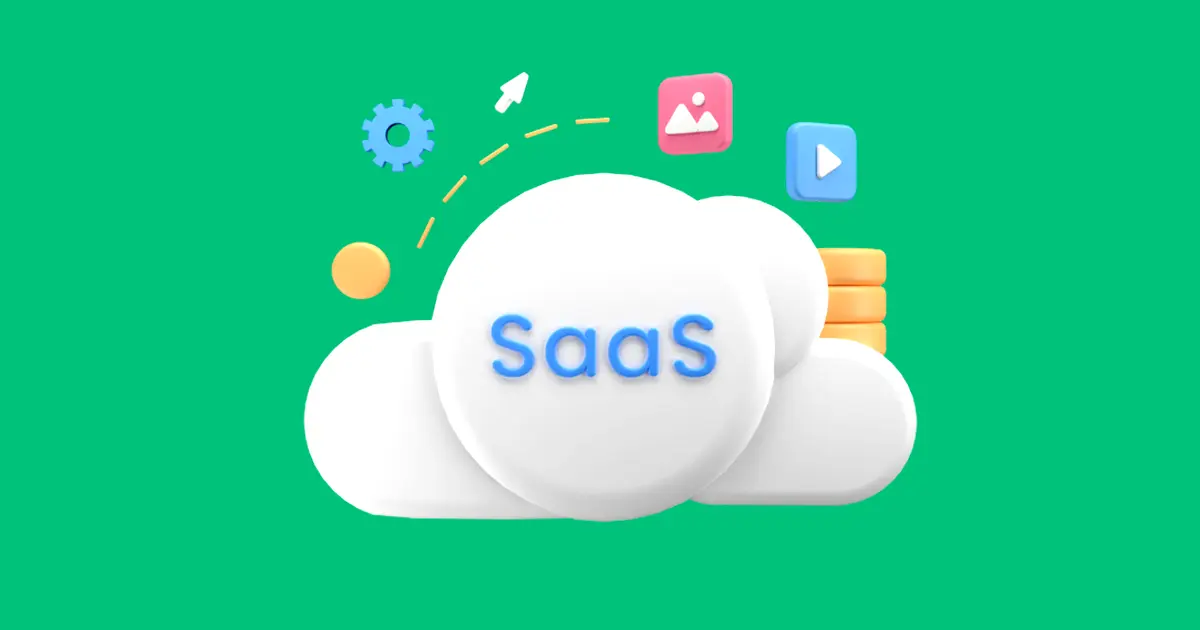
The SaaS learning management system (LMS) is a popular tool used to educate and train an audience online, at scale. It’s also a game-changer for organizations that offer accredited courses and certifications to employees and customers online. SaaS (software as a service) is software that’s stored in the cloud, meaning neither companies nor learners have to download anything to use it.
Academy of Mine is a good example of a SaaS learning management system since users can connect through the cloud to access educational materials. SaaS LMS platforms are convenient since you can manage online training programs without having to develop your own in-house proprietary platform.
Today, we’re going to look at what a SaaS learning management system is, why you need one, and the best options on the market.
What is a SaaS Learning Management System?
First of all, let’s clarify what a Learning management system (LMS) is.
An LMS is a system that facilitates the creation and management of online learning materials, such as courses that employees can take at their own pace. Businesses can use an LMS to administer their employee training and train other businesses, as well as sell training courses to customers. LMS platforms are great for reporting on learning progress since they keep track of learning-related metrics such as test scores, time spent on a course, and more!
A SaaS Learning Management System is a specific type of LMS that is hosted on the cloud and made available to you by a company. In other words, you license your LMS from a provider. The software’s hosted in the cloud, which means that customers don’t have to download software or install hardware on their devices to use the system. Additionally, all of your data is stored on a server and backed up for you, and you get access to whatever features and integrations your LMS provider offers (as well as their customer support).
Netflix is an example of a SaaS because customers can log in to their Netflix account from anywhere to watch movies. The alternative to SaaS LMS would be building your own platform using Open-Source technology. This may save you money in the short-term, but long-term it’s quite risky and has more expenses involved — such as server fees, integrations, bugs and lack of security issues.
Benefits of a SaaS Learning Management System

- Easy course deployment: If you’re working with an onsite LMS server, you’ll probably need an IT team to take care of the setup process for you. With a SaaS LMS, the technical side is taken care of by the company. So, you simply log in and go.
- Customer support: With an LMS that you built yourself, when things go wrong, you’re left by yourself to diagnose and fix things with forums and YouTube videos. With a SaaS provider, you can reach out to them for customer and technical support.
- Frees up your servers: Clogging up your servers with different software can impact performance, and it requires a tech team to implement in the first place. When you opt for a cloud-based LMS, your vendor hosts the LMS on their servers so that you don't have to worry about storage, backups, and unnecessary technicalities.
- Scalability and user-friendly software: This may be obvious to some of you, but the easiest way to grow your training program is with software that supports your growth. Partnering with an LMS vendor known for their flexible software is going to ensure that your online training platform can grow alongside your business. Purchasing an LMS that's easy-to-use and user-friendly is also simpler than having to develop your own software, in house!
- Pay as you go: Investing in an LMS is a big decision that can be costly. With SaaS LMSs, you select a subscription based on your needs. You can use this to your benefit, by paying for a plan that supports the state your training program is in. For example, if you need your LMS to cater to only 100 active users, you would choose the Academy of Mine Starter plan for $299/month (upgrade at any time).
Criteria to Consider When Choosing a SaaS Learning Management System

- Training needs: No one online training solution will fit every business. To figure out what your training needs are, think about your goals for training, the size of your training program, and the type of training content you wish to create. You can also collaborate with potential trainees and relevant departments to get other opinions.
- Features: Whether you’re a first-time LMS buyer or you’re switching LMS providers, understanding what features you need is key. If you’re an LMS newbie, think of your goals to determine what software features you need to achieve them. For example, if you need to create an on-demand course for users to train and earn certificates, your LMS needs to support self-paced courses and certificate generation & delivery.
- Integrations and APIs: Integrations and APIs add to the flexibility and functionality of the software. As a SaaS LMS operates in the cloud, you can integrate it with third-party apps, even if you have very little technical knowledge. Academy of Mine integrates with Shopify and WooCommerce for those wanting to sell their courses through an existing store.
- Pricing variations: Prices vary greatly between different LMSs for a variety of reasons. For example, does an LMS do pricing based on monthly active users? Or, do they price their platform at a flat-rate (regardless of how many users are in the system)? When you subscribe to a SaaS LMS, you are effectively purchasing space in the cloud to store your eLearning programs. In this case, the amount of storage space you get with your SaaS LMS might depend on the plan you choose, and therefore the price you pay.
Now, let’s talk about some of the best SaaS learning management systems on the market.
1) Academy of Mine (AOM)

Academy of Mine is the SaaS LMS of choice for businesses and educators wanting to create personalized, engaging, and impactful courses.
AOM is designed to scale with you as your business grows, and it has plenty of branding options to ensure your curriculum speaks to the right audience. Create professional-level accredited courses with certifications and watch your learners progress in their own time. In addition to self-paced courses, AOM also connects with webinar tools to host instructor-led training on the platform — it's also notoriously good for training different customers simultaneously (using a feature called B2B Portals).
Features
- Create on-demand training courses that your students can complete in their own time.
- Host live training sessions through the likes of Zoom, MS Teams, and other video-conferencing applications.
- Platform is fully white-labeled and customizable. - Add brand logos, colors, adjust text sizes, buttons, messages, and more.
- Develop learning materials for safety & compliance, customer training, and employee development, and more.
- Track learner progress with in-depth learner reports and user analytics.
- Sell courses directly on the platform or integrate with Shopify, Woocommerce, etc.
Pricing
To get hooked up to Academy Of Mine, choose from three comprehensive plans. Prices start at $299/month, and this plan allows for 100 monthly users, and access to features like certificates, live webinar integrations, self-paced courses, learner reporting & analytics, and more. Plus, all the plans let you create unlimited courses and upload SCORM content.
Pros
- Simple pricing structure.
- User-friendly software for both admins and students.
- Create and award certificates.
- The software is highly-customizable.
- Reliable customer support team.
- B2B portals (for training external organizations).
- Integrate with your eCommerce store or sell courses directly on the LMS.
Cons
- Some people might find the initial setup has a high learning curve.
2) LearnUpon
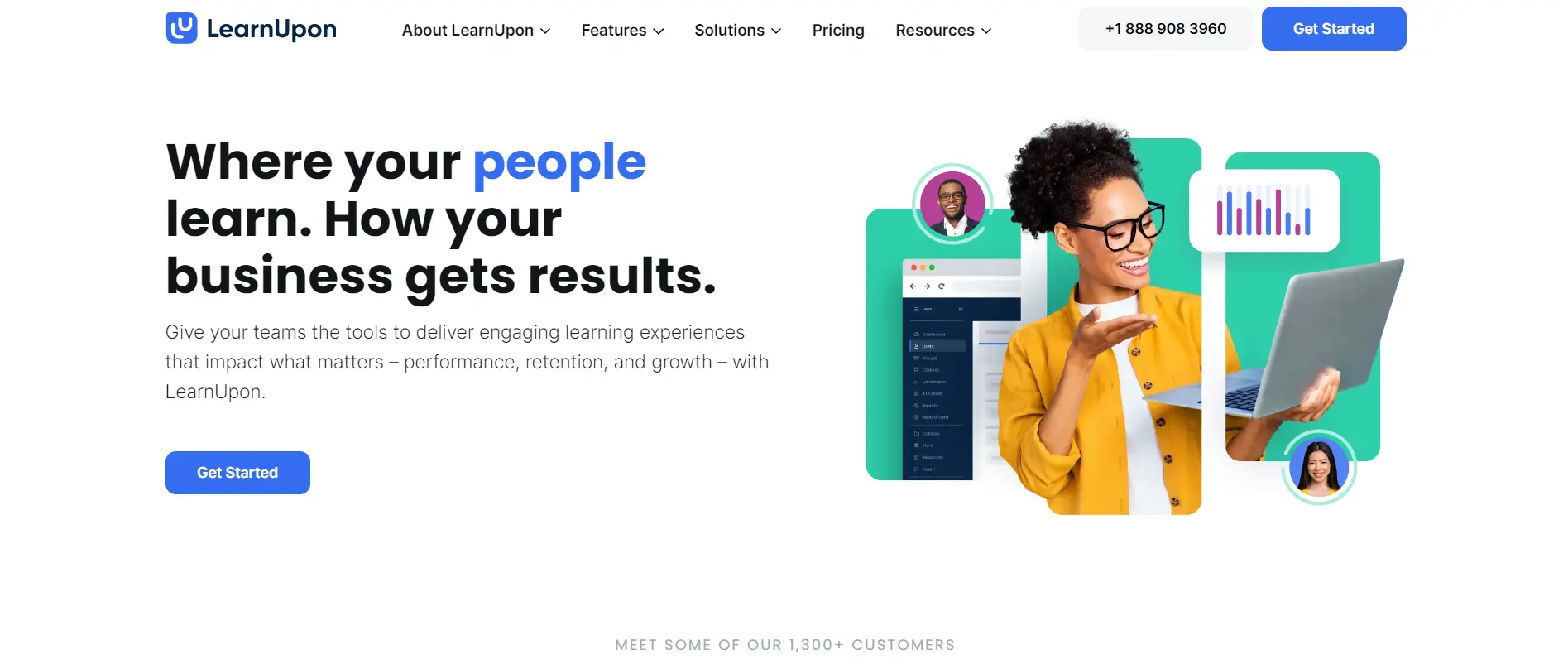
LearnUpon is an LMS that aims to ‘put learners first’. With LearnUpon, users can create engaging content that motivates their learners and pushes them to achieve their educational goals. If you are looking to gamify your courses to make courses more fun, then LearnUpon is also a good option. Additionally, with LearnUpon, you can help learners find that competitive streak by creating leaderboards that compare student progress.
Features
- Gamify your courses with badges and leaderboards.
- Award students with certificates and course credits.
- Bulk upload lets you add thousands of users from a spreadsheet.
- Segment your students to show different content to different audiences.
- Out-of-the-box reports for valuable user insights.
Pricing
There are three plans on the LearnUpon website: Essential, Premium, and Enterprise. However, there are no prices available. To get started, you have to contact the team. If you opt for the Premium plan, you’ll benefit from two-way API access, Zapier integration, and the ability to create courses in multiple languages. This plan is normally suitable for between 150 and 300 users.
Pros
- Good customer support.
- Easy to use, intuitive software.
- Easily customize your portal with brand colors.
- Enterprise-grade security.
- Customers claim it’s good value for money.
Cons
- No prices are available on the website.
- Expensive for training programs with many users.
3) Docebo

Docebo uses AI to deliver an exceptional learning experience. Use this SaaS LMS to deliver training content for onboarding, employee development, and customer education. The platform is both flexible and scalable, which is perfect for companies with training programs of all sizes — whether you're training 100 users or 10,000.
Features
- AI-powered for improved functionality and scalability.
- Custom reports include your ROI on learning resources.
- Launch your own branded app for learners to use on the go.
- Lots of integrations including Google Drive, Shopify, Zendesk, and Salesforce.
- Create specific pages for different learners.
- Gamify your courses for a more engaging experience.
Pricing
There is currently no indication of the cost of Docebo, you must contact the team for a quote.
Pros
- Smooth and clean interface.
- Demo available.
- Highly scalable software to grow as you do.
- Supports private courses for individual clients.
- The mobile app is available.
Cons
- Customer support can be lacking compared to other providers.
4) Skillcast LMS

Skillcast LMS is designed for users to create compliance training programs. With Skillcast LMS, employees can access your compliance course content in just one click. Easily create courses on GDPR (global compliance) and risk management, to name just a few topics. Skillscast also has powerful reporting tools that can synchronize data with your HR system.
Features
- Create job role-specific compliance courses.
- Learner certificates for either passing or completing a course.
- Customize courses with company branding.
- Create learning paths for each of your employees.
- Gamified assessments make assessments more fun, and interactive.
Pricing
Skillcast charges an annual fee per user. The more users you include in your plan, the lower the cost per user is. For example, the Premium Plan costs £91.30 per user if you select 20 users. But, if you choose 100 users, the cost drops dramatically to £32.56 per user. This Premium plan includes most of the platform’s features, like workplace surveys, advanced reporting, and custom branding. Skillcast also comes complete with 2GB of storage.
Pros
- Designed for compliance training.
- Pre-built courses for quicker deployment.
- Good customer support.
- Free trial available.
- Feature-rich software.
Cons
- Expensive for smaller companies.
5) 360Learning
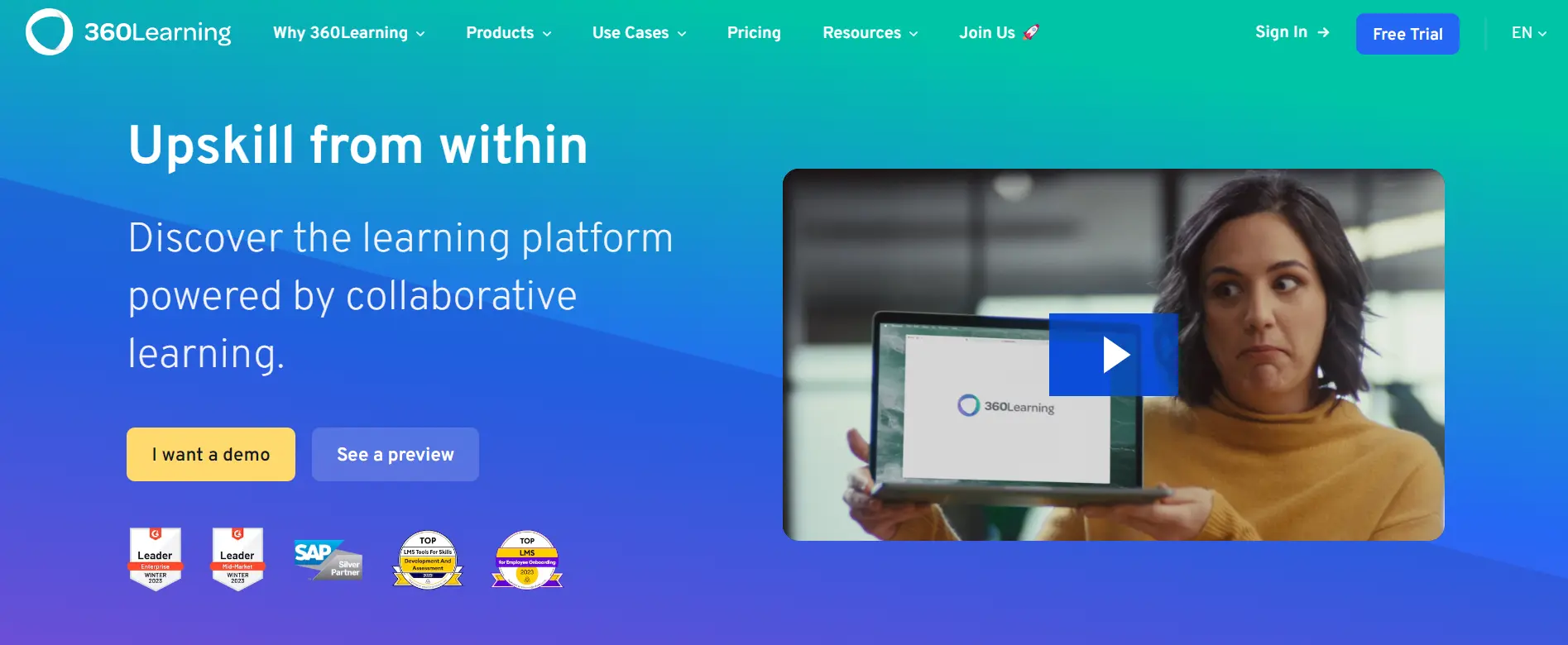
360Learning offers collaborative learning for effective training courses, which provides a space where team members learn from each other, regarding course materials. Plus, industry experts within your own company can leverage the platform to teach their classes online, which can be a great way to onboard new employees with specialist knowledge and upskill existing employees. 360Learning also uses AI technology to further optimize its platform. 360Learning can also help streamline your business workflows by connecting all of your systems to 360Learning.
Features
- A collaborative learning approach means team members share their skills and knowledge.
- Receive real-time feedback from learners.
- Automatic enrollment of learners.
- Data-driven insights on all your students.
- Host live training sessions.
Pricing
360Learning costs $8/user/month for the Team plan. With this plan, you can add up to 100 users. You get access to all the software features, as well as the 360Learning Academy, which teaches you how to design courses, engage your learners, and interpret your data.
Pros
- Integrates with your existing software and processes.
- Free 30-day trial.
- Modern interface.
- Intuitive software.
- Good customer support.
Cons
- Reporting tools are not very in-depth.
Which SaaS LMS is Best For You?
A SaaS LMS is a scalable solution to create comprehensive training programs for employees, customers, and partners, all on the cloud.
From easy course deployment and reliable customer support to scalability and user-friendly software, SaaS LMS platforms like the Academy of Mine provide a range of features to enhance online training programs. Each platform has its strengths and pricing options, catering to different needs and budgets, ultimately allowing you to choose the best fit for your company.
If you want to see how Academy Of Mine can help, let’s talk on a call
